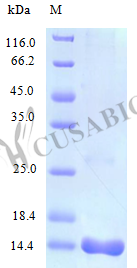This recombinant Human CCL25 protein is a high-quality research tool designed for a wide range of immunology applications. Also known as C-C motif chemokine 25, this full-length mature protein is expressed in E. coli, covering the 24-150aa expression region. The tag-free, lyophilized powder can be easily reconstituted with sterile water or buffer, ensuring hassle-free use.
The quality of our Recombinant Human CCL25 protein is guaranteed, with a purity of >97% as determined by SDS-PAGE and HPLC analysis. Additionally, endotoxin levels are maintained below 1.0 EU/µg, as determined by the LAL method. Our CCL25 protein demonstrates full biological activity in a chemotaxis bioassay using human monocytes, with an effective concentration range of 1.0-10 ng/ml.
CCL25 has been the subject of numerous studies investigating its role in the immune system. For instance, Zaballos et al. (1999)[1] discovered that CCL25 is a potent chemoattractant for lymphocytes, particularly T cells. Later, Bowman et al. (2006)[2] highlighted the involvement of CCL25 in the development and function of the small intestine's immune system. Most recently, research by Kim et al. (2017)[3] revealed a connection between CCL25 and rheumatoid arthritis, suggesting potential therapeutic applications in this disease. Taken together, these findings emphasize the importance of CCL25 in immune regulation and its potential as a target for future interventions.
References:
1. Zaballos A, et al. Identification of a novel CC chemokine, human eotaxin-2, that is specific for CCR3 and displays high eosinophil chemotactic activity. J Immunol. 1999;162(11): 6798-801.
2. Bowman EP, et al. The intestinal chemokine thymus-expressed chemokine (CCL25) attracts IgA antibody-secreting cells. J Exp Med. 2006;203(3): 507-13.
3. Kim HR, et al. Chemokine CC motif ligand 25 enhances resistance to apoptosis in CD4+ T cells from patients with rheumatoid arthritis by increasing the activation of the PI3K/Akt and STAT3 pathways. Front Immunol. 2017;8: 820.






